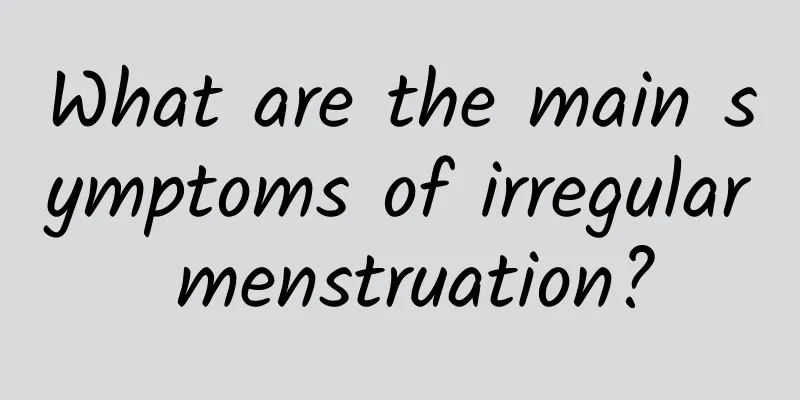How to supplement estrogen during menopause

|
Estrogen supplementation during menopause can help relieve some common symptoms, such as hot flashes, night sweats, and irritability and anxiety. If you are not experiencing any discomfort, supplementation is generally not necessary. For those women who experience symptoms, estrogen supplementation can be an effective option. 1. Symptom identification and individualized treatment Symptoms of menopause vary, and common ones include hot flashes, night sweats, irritability, and vaginal dryness. Each person's situation is different, and treatment needs to be tailored to the individual. It is usually recommended to carry out individualized treatment at the minimum effective dose under the guidance of a doctor, which can both relieve symptoms and avoid overdose. 2. Estrogen supplementation methods Estrogen can be supplemented in a variety of ways. Common methods include oral medication and parenteral administration. Oral medication is the most traditional way and is convenient and easy to use. Parenteral administration, such as transdermal patches or vaginal administration, is suitable for women who are intolerant to oral medications or have specific needs. These methods can effectively relieve symptoms such as hot flashes and help prevent osteoporosis. 3. Progestin combined therapy For women with an intact uterus, progestin combined therapy is a good option. By adding progestin to estrogen, it can simulate the physiological cycle and reduce the risk of endometrial hyperplasia. Progestin is usually added in the second half of the treatment. This method can not only relieve menopausal symptoms, but also protect the health of the uterus. 4. Lifestyle and diet adjustments In addition to medication, lifestyle adjustments are also important. Proper exercise, a healthy diet, and a good work and rest schedule can alleviate menopausal symptoms to a certain extent. For example, consuming more foods rich in calcium and vitamin D is good for bone health, while foods rich in phytoestrogens, such as soy products, may help relieve symptoms. 5. Mental health and support Menopause is not only a physiological change, but also a psychological challenge. Maintaining a good mental state, seeking support from family and friends, and even professional psychological counseling can help women better get through this stage. Emotional stability and a positive attitude also play a significant role in alleviating symptoms. 6. Regular health check-ups Regular health checks can help timely detect and deal with health problems that may arise during menopause. In particular, bone density testing and breast examinations are very important for preventing osteoporosis and breast diseases. Through these examinations, doctors can provide patients with more targeted health advice. During menopause, estrogen supplementation is an effective means of relieving uncomfortable symptoms, but it needs to be done under the guidance of a professional doctor and combined with lifestyle adjustments to achieve the best results. Every woman's physical condition and needs are different, and a personalized treatment plan is the key to achieving a healthy transition. |
<<: Is it normal to have a period every 35 days?
>>: What is vulvar itching and how to treat it
Recommend
What nutrients are needed in the diet for threatened abortion
We are all familiar with threatened abortion. If ...
Highly recommended female Korean star! Grape detoxification, lose 1.5 kg
Grapes look like purple gems and are believed to ...
Women should pay attention to the symptoms of uterine fibroids
Uterine fibroids are similar to many gynecologica...
Does cervical erosion affect fertility? Patients with cervical erosion must undergo these treatments before giving birth.
There are many cervical diseases that are common ...
The manifestation of ovarian cyst symptoms determines whether you are healthy
The most effective way to prevent ovarian cysts i...
What fruits can't be eaten after an abortion? What is the best way to nourish the body after an abortion?
Abortion is a common gynecological procedure that...
What to eat when you have pelvic inflammatory disease
Pelvic inflammatory disease is one of the common ...
Excessive visceral fat leads to diabetes. Can drinking green tea eliminate it? Dr. Liu Boen: 4 tips to eliminate visceral fat
Do people with a lot of fat always look fat? Are ...
Recurrent bacterial vaginosis requires attention to diet
If a woman develops bacterial vaginosis and does ...
Why do I have my period twice a month?
Why do we have menstruation twice a month? The re...
Sleep well and lose weight like a god! Liver cleansing and soothing tea helps you sleep well
If you want to lose weight more efficiently, slee...
What to do if pregnant women have vulvar itching
Pregnant women are a group of people who need spe...
What should not be eaten after miscarriage? What should be paid attention to in dietary adjustments after miscarriage?
After a miscarriage, you must make a reasonable a...
Female headache is one of the hazards caused by irregular menstruation
Experts say that irregular menstruation is mainly...
Don't be careless about irregular menstruation during puberty. Check early to prevent polycystic ovary syndrome
Don't be careless about irregular menstruatio...









